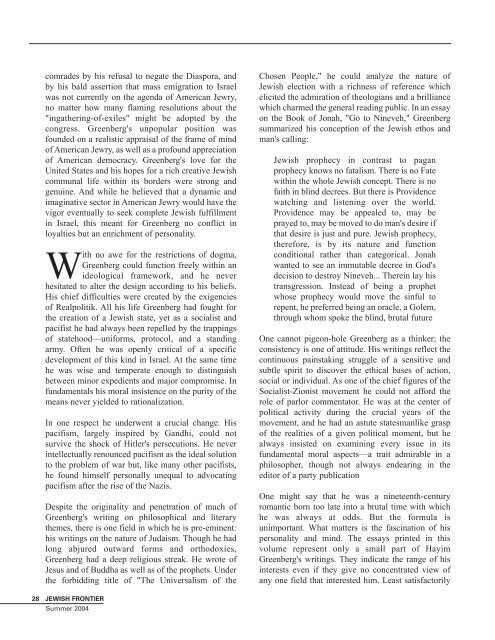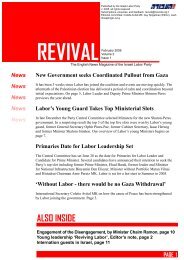Create successful ePaper yourself
Turn your PDF publications into a flip-book with our unique Google optimized e-Paper software.
comrades by his refusal to negate the Diaspora, and<br />
by his bald assertion that mass emigration to Israel<br />
was not currently on the agenda of American Jewry,<br />
no matter how many flaming resolutions about the<br />
"ingathering-of-exiles" might be adopted by the<br />
congress. Greenberg's unpopular position was<br />
founded on a realistic appraisal of the frame of mind<br />
of American Jewry, as well as a profound appreciation<br />
of American democracy. Greenberg's love for the<br />
United States and his hopes for a rich creative Jewish<br />
communal life within its borders were strong and<br />
genuine. And while he believed that a dynamic and<br />
imaginative sector in American Jewry would have the<br />
vigor eventually to seek complete Jewish fulfillment<br />
in Israel, this meant for Greenberg no conflict in<br />
loyalties but an enrichment of personality.<br />
With no awe for the restrictions of dogma,<br />
Greenberg could function freely within an<br />
ideological framework, and he never<br />
hesitated to alter the design according to his beliefs.<br />
His chief difficulties were created by the exigencies<br />
of Realpolitik. All his life Greenberg had fought for<br />
the creation of a Jewish state, yet as a socialist and<br />
pacifist he had always been repelled by the trappings<br />
of statehood—uniforms, protocol, and a standing<br />
army. Often he was openly critical of a specific<br />
development of this kind in Israel. At the same time<br />
he was wise and temperate enough to distinguish<br />
between minor expedients and major compromise. In<br />
fundamentals his moral insistence on the purity of the<br />
means never yielded to rationalization.<br />
In one respect he underwent a crucial change. His<br />
pacifism, largely inspired by Gandhi, could not<br />
survive the shock of Hitler's persecutions. He never<br />
intellectually renounced pacifism as the ideal solution<br />
to the problem of war but, like many other pacifists,<br />
he found himself personally unequal to advocating<br />
pacifism after the rise of the Nazis.<br />
Despite the originality and penetration of much of<br />
Greenberg's writing on philosophical and literary<br />
themes, there is one field in which he is pre-eminent:<br />
his writings on the nature of Judaism. Though he had<br />
long abjured outward forms and orthodoxies,<br />
Greenberg had a deep religious streak. He wrote of<br />
Jesus and of Buddha as well as of the prophets. Under<br />
the forbidding title of "The Universalism of the<br />
Chosen People," he could analyze the nature of<br />
Jewish election with a richness of reference which<br />
elicited the admiration of theologians and a brilliance<br />
which charmed the general reading public. In an essay<br />
on the Book of Jonah, "Go to Nineveh," Greenberg<br />
summarized his conception of the Jewish ethos and<br />
man's calling:<br />
Jewish prophecy in contrast to pagan<br />
prophecy knows no fatalism. There is no Fate<br />
within the whole Jewish concept. There is no<br />
faith in blind decrees. But there is Providence<br />
watching and listening over the world.<br />
Providence may be appealed to, may be<br />
prayed to, may be moved to do man's desire if<br />
that desire is just and pure. Jewish prophecy,<br />
therefore, is by its nature and function<br />
conditional rather than categorical. Jonah<br />
wanted to see an immutable decree in God's<br />
decision to destroy Nineveh... Therein lay his<br />
transgression. Instead of being a prophet<br />
whose prophecy would move the sinful to<br />
repent, he preferred being an oracle, a Golem,<br />
through whom spoke the blind, brutal future<br />
One cannot pigeon-hole Greenberg as a thinker; the<br />
consistency is one of attitude. His writings reflect the<br />
continuous painstaking struggle of a sensitive and<br />
subtle spirit to discover the ethical bases of action,<br />
social or individual. As one of the chief figures of the<br />
Socialist-Zionist movement he could not afford the<br />
role of parlor commentator. He was at the center of<br />
political activity during the crucial years of the<br />
movement, and he had an astute statesmanlike grasp<br />
of the realities of a given political moment, but he<br />
always insisted on examining every issue in its<br />
fundamental moral aspects—a trait admirable in a<br />
philosopher, though not always endearing in the<br />
editor of a party publication<br />
One might say that he was a nineteenth-century<br />
romantic born too late into a brutal time with which<br />
he was always at odds. But the formula is<br />
unimportant. What matters is the fascination of his<br />
personality and mind. The essays printed in this<br />
volume represent only a small part of Hayim<br />
Greenberg's writings. They indicate the range of his<br />
interests even if they give no concentrated view of<br />
any one field that interested him. Least satisfactorily<br />
28 JEWISH FRONTIER<br />
Summer 2004




